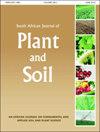Introduction to the Special Issue on Conservation Agriculture in South Africa
IF 0.7
Q3 AGRONOMY
引用次数: 0
Abstract
Conservation Agriculture (CA) as a pathway towards sustainable agriculture has gained a firm foothold in South Africa over the last decade, as is evident from reported adoption rates and the interest it attracts in farmers’ organisations and media. Globally, CA practices have been widely adopted in the Americas and Australia on large farms. The drivers of adoption and impacts of CA practices on sustainability indicators have been relatively well documented for these regions. Benefits from CA relate to ease of crop management, energy, cost and time savings, and soil and water conservation (Giller et al. 2015). In Africa, research on and promotion of CA practices have mostly taken place in smallholder environments with rather mixed results in terms of adoption and impacts on soil and water conservation, though there is emerging evidence that CA benefits farmers in regions that are prone to erratic rainfall (Stevenson et al. 2014). As the agricultural landscape in South Africa is highly diverse and rather different from the rest of the continent, the research experiences and lessons learned with CA in South Africa make up an interesting case study. South Africa harbours large-scale, technologically advanced crop farms that are often located in semi-arid regions with erratic rainfall. This suggests that the adoption of CA practices in South Africa, with all its adaptations to the farmers’ unique circumstances, can nevertheless be regarded as aligned with developments in Australia and the Americas. In addition, soil conservation approaches in South Africa are applied in systems other than rainfed annual crop production, such as irrigated cropping systems, orchards and mixed crop-livestock systems, in a flexible and non-dogmatic manner. Furthermore, South Africa harbours large numbers of mediumand small-scale crop farmers who are highly limited in their access to technologies and ability to apply technologies. Thus, the implementation of CA and related practices in South Africa occurs in diverse biophysical and socio-economic environments and in different types of production systems. This special issue aims to bring together available knowledge and experiences with CA in South Africa from different systems and disciplines. A CA workshop organised in Bloemfontein in 2019 was the starting point for the development of this special issue. In this issue, Swanepoel (2021) provides an integrated discussion of the various contributions leading to the development of a research agenda around the key themes of CA in South Africa and the question of how CA approaches can contribute to sustainable intensification. This is followed by focused contributions in the fields of annual crop production, orchards and vineyards, irrigated agriculture, soil fertility management, soil surveying and weed control. I would like to thank all the authors for their contributions to this special issue, and in particular Dr Cobus Botha, who has both coordinated it and served as a guest editor.南非保护性农业特刊导言
保护农业(CA)作为通往可持续农业的途径,在过去十年中已经在南非获得了坚实的立足点,这一点从报告的采用率和农民组织和媒体对它的兴趣中可以明显看出。在全球范围内,CA做法已在美洲和澳大利亚的大型农场广泛采用。在这些地区,采用CA做法的驱动因素和对可持续性指标的影响已经有了相对较好的记录。CA的好处包括简化作物管理,节约能源、成本和时间,以及水土保持(Giller et al. 2015)。在非洲,对CA实践的研究和推广主要是在小农环境中进行的,在采用和对水土保持的影响方面,结果好坏参半,尽管有新证据表明CA有利于降雨不稳定地区的农民(Stevenson et al. 2014)。由于南非的农业景观高度多样化,与非洲大陆其他地区大不相同,因此南非CA的研究经验和教训构成了一个有趣的案例研究。南非拥有大规模、技术先进的农作物农场,这些农场通常位于降雨不稳定的半干旱地区。这表明,尽管南非采用了针对农民独特情况的CA实践,但可以被视为与澳大利亚和美洲的发展相一致。此外,南非的土壤保持办法以灵活和非教条的方式应用于除雨养年度作物生产以外的其他系统,例如灌溉种植系统、果园和混合作物-牲畜系统。此外,南非拥有大量的中小型作物农民,他们在获得技术和应用技术的能力方面非常有限。因此,南非在不同的生物物理和社会经济环境中以及在不同类型的生产系统中实施CA和相关做法。本期特刊旨在汇集来自不同系统和学科的南非CA的现有知识和经验。2019年在布隆方丹举办的CA研讨会是本期特刊发展的起点。在本期中,Swanepoel(2021)对各种贡献进行了综合讨论,这些贡献导致了围绕南非CA关键主题的研究议程的发展,以及CA方法如何促进可持续集约化的问题。其次是在年度作物生产、果园和葡萄园、灌溉农业、土壤肥力管理、土壤调查和杂草控制等领域作出重点贡献。我要感谢所有作者为本期特刊所做的贡献,特别是Cobus Botha博士,他协调了本期特刊并担任特邀编辑。
本文章由计算机程序翻译,如有差异,请以英文原文为准。
求助全文
约1分钟内获得全文
求助全文
来源期刊

South African Journal of Plant and Soil
Agricultural and Biological Sciences-Plant Science
CiteScore
1.90
自引率
11.10%
发文量
32
期刊介绍:
The Journal has a proud history of publishing quality papers in the fields of applied plant and soil sciences and has, since its inception, recorded a vast body of scientific information with particular reference to South Africa.
 求助内容:
求助内容: 应助结果提醒方式:
应助结果提醒方式:


